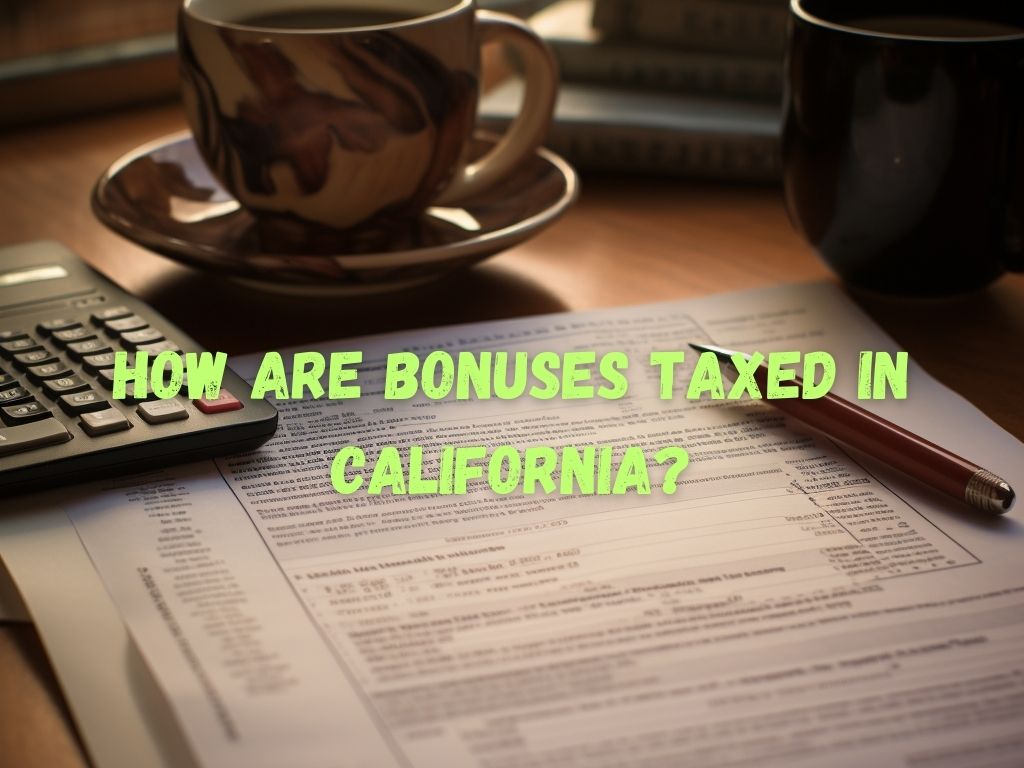Bonuses are additional compensation provided to employees, often as a reward for their performance or contributions to the company’s success.
But when it comes to tax implications, understanding how are bonuses taxed in California is crucial.
In this comprehensive guide, we will dive into the details of bonus taxation, including federal and state considerations, tax calculations, reporting requirements, deductions, and frequently asked questions.
Federal Taxation of Bonuses
For federal taxation purposes, bonuses are classified as supplemental wages. These include any payment made to an employee that is not part of their regular salary or wages.
When it comes to bonus taxation, the IRS provides two preferred methods for calculating withholding: the percentage method and the aggregate method.
The percentage method involves a flat tax rate of 22% for supplemental wages up to $1 million.
For amounts exceeding $1 million, the rate increases to 37%. Alternatively, the aggregate method calculates the total income by combining the employee’s bonus with their regular wages and applying the tax rate based on the total amount.
Can bonuses impact federal tax brackets?
Yes, bonuses can impact federal tax brackets. When receiving a bonus, the additional income can push an individual into a higher tax bracket temporarily.
However, keep in mind that bonuses are withheld at a flat rate for federal income tax purposes (either 22% or 37% depending on the amount).
The normal progressive tax rates are applied to the regular wages, which are combined with the bonus amount for tax calculation purposes.

How Are Bonuses Taxed in California? The State Taxation Explained
In addition to federal taxes, bonuses earned in California are subject to state income tax.
California has a progressive income tax system, with tax rates ranging from 1% to 13.3% depending on the individual’s income bracket.
It’s important to note that bonuses are taxed as ordinary income, which means they are subject to the same rates as regular wages.
How can I estimate my bonus tax liability in California?
Estimating your bonus tax liability in California can be challenging due to the progressive tax rate system and the various factors that determine the tax amount.
To get an estimate, you can use tax calculators available on reputable tax websites.
These calculators consider the bonus amount, your regular wages, and other relevant information to calculate your tax liability.
Keep in mind that these estimations are for general guidance, and consulting with a tax professional is recommended for accurate and personalized advice.
Tax Calculation Examples
Understanding how bonus taxes are calculated can help employees plan and budget accordingly. Let’s consider two examples:
Example 1: John earns a bonus of $10,000 in addition to his regular salary. His total income for the year is $70,000. Using the percentage method, the bonus withholding would be $2,200 (22% of $10,000).
Example 2: Sarah’s bonus is $50,000, and her regular annual income is $200,000. With the aggregate method, Sarah’s total income is $250,000, subject to the progressive tax rates in California.
Reporting and Withholding Requirements
Employers have certain responsibilities when it comes to reporting and withholding taxes on bonuses.
They must include the bonus amount on Form W-2, Wage and Tax Statement, which is provided to employees for tax reporting purposes.
The employer is also required to withhold federal income tax, Social Security tax, and Medicare tax on the bonus amount.
Employees, on the other hand, must report the bonus income on their individual tax returns. This ensures compliance with tax laws and avoids potential penalties or audits.
Deductions and Allowances
Though bonus income is subject to taxation, some deductions and allowances can help reduce the overall tax liability.
Common deductions include state and local taxes paid, mortgage interest, student loan interest, and contributions to retirement accounts such as IRAs and 401(k)s.
It is essential for employees to consult with tax professionals to maximize their potential deductions and minimize their tax burdens.
Changes in Bonus Taxation Laws
Tax regulations and laws are subject to change, and it is crucial to stay informed about any updates related to bonus taxation.
It is especially important for employers and employees to stay updated on any changes in California bonus taxation laws to ensure compliance and minimize any potential tax surprises.

Frequently Asked Questions
Are bonuses subject to Social Security and Medicare taxes?
Yes, bonuses are subject to Social Security and Medicare taxes. These taxes are known as Federal Insurance Contributions Act (FICA) taxes.
For Social Security, the tax rate is 6.2% on wages up to a certain limit (as of 2021, the limit is $142,800).
For Medicare, the tax rate is 1.45% on all wages. It’s important to note that the Social Security tax has a wage cap, while the Medicare tax does not.
Are there any withholding limitations on bonus payments?
No, there are no specific withholding limitations on bonus payments. However, supplemental wages, including bonuses, are subject to mandatory federal income tax withholding.
Employers follow the IRS guidelines for determining the appropriate withholding rates based on the employee’s Form W-4 and the chosen withholding method (percentage or aggregate).
Are bonuses taxed differently for different types of employees (e.g., full-time vs. part-time)?
No, bonuses are generally taxed the same way for all employees, regardless of their employment status (full-time, part-time, or contractual).
Bonus income is treated as supplemental wages and subject to the same federal and state tax rules as regular wages.
However, it’s important to check if there are any specific employment arrangements or tax treatments that may apply in certain circumstances.
Conclusion:
Understanding how bonuses are taxed in California is essential for both employers and employees.
By being knowledgeable about federal and state tax requirements, individuals can ensure accurate reporting, minimize tax liabilities, and avoid potential penalties.
It is recommended to seek professional tax advice to navigate the intricacies of bonus taxation and make informed financial decisions. Stay updated on any changes in tax laws to remain compliant and plan your finances effectively.


 Tags:
Tags:










